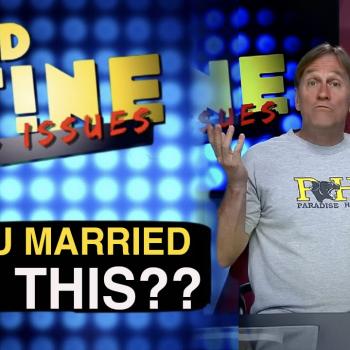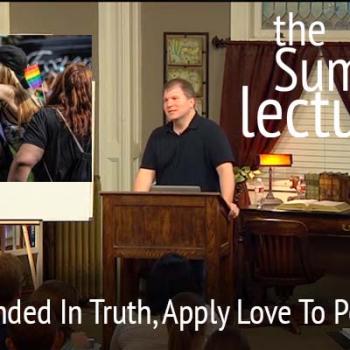How Marriage Was Redefined
To purchase the entire Summit Lecture Series, Vol. 2 on DVD, visit summit.org.
John Stonestreet:
Now, the reason this is so hard to argue is because for a long time in American society, we have actually embraced the revisionist view in an awful lot of ways. We have thought that marriage is nothing more than intensity. This started, by the way, not with Windsor legalizing same-sex marriage in various states and on a federal level, what it started with, and it didn’t start with Massachusetts, and it didn’t start with Hawaii, it started with no-fault divorce because no-fault divorce actually put this view of marriage in law.
What it actually said was this, “If you have strong feelings, you can enter marriage. And if you lose those strong feelings, you can…” What? Exit marriage. And so we replaced this view of marriage with the revisionist view of marriage. But the fact of the matter is the revisionist view of marriage is not a strong enough view of marriage to actually be considered marriage.
And we know this. In fact, the government has operated this way for a really long time. When I went to get a marriage license, I asked Sarah to marry me. I had to go to the county clerk’s office in Dayton, Tennessee. Anybody here from Tennessee and the south? Yeah. Anybody here from Alabama? Anybody here from Mississippi, Arkansas? Anybody here from Texas? Just kidding.
All right. So, when I went to the county clerk’s office in Dayton, Tennessee, and I asked for a marriage license, they did not respond. The lady behind the counter said, “Now, wait a minute, are you sure you love her? Here’s a test from Cosmo magazine. Four tests on whether you love your spouse, and you pass this and I’ll give you a…” That’s not what she asked. She did ask me questions, but she didn’t ask me how strongly I felt.
Why? Because the government has no interest in how strongly a couple feels about each other. A government has an interest in the relationship that will produce children. So, you know what they asked me? They asked me questions, but it wasn’t about how much I loved her. Here’s the questions they asked me.
Number one, “Is she old enough?” This is a good question to ask in Tennessee. I’m just going to tell you, okay? Is she old enough? Right? In other words, if she’s not old enough, she belongs to another family and you’re going to break up a family to start a family, and a family is… You see what I mean? So, it’s going back to that conjugal view of marriage.
And the number two thing they asked me is, “Is she already married or are you already married?” Which is a good thing to ask in Tennessee, by the way, okay? All right. And in other words, “Because you’re going to be breaking up a family.” And the third question they ask is, “Are you related?” Which is a good question, obviously. They ask, “Are you related?”
Why? Because why can’t people who are related… Why do we discriminate? By the way, well, you shouldn’t discriminate with marriage. Marriage discriminates against all kinds of couples. Marriage discriminates against the already married, marriage discriminates against the too young and marriage discriminates against incestuous couples. Why does marriage discriminate against incestuous couples? Why?
It doesn’t do any good to the society.
It doesn’t do any good to the society, but not only that, it actually has potential harm.
Yeah, the kids.
The offspring. There’s a genetic problems with the offspring. That’s why incestuous relationships are wrong. Now, just in case you don’t… That’s why we’ve always discriminated against incestuous relationships. It’s not arbitrary. Now, when we think about it. And we’re like, “Ooh, that is creepy.” Right? But it had to do with genetics. It had to do with offspring because marriage isn’t just about feelings. Marriage is also about babies.
Now, just in case you think all of this hasn’t gone nuts in our culture and we haven’t reached a tipping point, if all marriage is about, is about intensity of feelings, then we have no ground whatsoever to limit marriage from any loving couple. We couldn’t then justify limiting… In fact, it doesn’t have to be a couple. It could be what Ryan Anderson is calling a throuple. You know what a throuple is? Any guesses?
Three. It’s called polyamory: more people. Why does it have to be two? If it doesn’t have to do with children, if it doesn’t have to do with male and female, why does it have to be limited to two? Why can’t it be three? Why can’t it be four? Why can’t it be for non-sexual couples? Why can’t it be for incestuous couples?
When we changed the definition of marriage to say, “Marriage is justified by people strongly having emotions for each other.” There is no longer any way to limit it away from other couples. In other words, expanding marriage to same-sex couples is not expanding marriage. It’s redefining marriage for everyone, because now it’s saying that for no one is marriage about procreation or oneness.
You think I’m crazy. I was in Australia three weeks ago. And the week before I was down there, did I tell you this? A judge in Australia basically said, “Bans against incestuous marriage are discriminatory because the only reasons we had bans against incestuous couples is because of procreation and because of potential of offspring and genetic defects,” and that sort of stuff.
So, this judge said, “Now though, we have birth control and abortion. So, it’s no longer that marriage is connected with babies and so we have no right to say that an incestuous couple can’t be married.” And all God’s people said, “Ugh.” But here’s the point, is he being consistent with the new definition of marriage? Does that make sense?
Now, there’s a whole other part of this, which is how do we talk about this? There’s a whole other part of this. How did we get here? And Sean McDowell and I… Is Sean here this session? No? Sean McDowell is a son of Josh McDowell. He and I got together about a year ago, and we put a plan to write this book. And the reason we wanted to write this book is a couple of things.
Number one is we realized that this was no longer an issue that was coming. It was an issue that was here, right? It was one of those things that American society had held off, but you have to deal with same-sex marriage now in your lifetime. In fact, even if you don’t have to deal with it in your state, you have to deal with it in the cultural imagination. We don’t have same-sex marriage in Colorado, and yet a baker, get this, a baker was fined and sent to sensitivity training for not baking a same-sex wedding cake in a state where we don’t have same-sex weddings. You put that math together.
It wasn’t a civil unions cake that the couple asked. It was specifically in the judge’s decision, civil rights commission decision, same-sex wedding cake. He said, “Sorry, I don’t do that.” He served them cupcakes. It wasn’t discrimination against the people. He said, “I just can’t participate in this ceremony.” And he was actually fined for not baking a same-sex wedding cake in a state where we don’t have same-sex weddings.
So, John, what’s your point? My point is, the question is, what are you going to do? How are you going to stand for truth in a culture in which if you do it, now you’re really going to have to pay for it? And that’s just the way that it is. It’s a brave new world.
When I was in Sunday school as a kid, my teachers would play this thing and they would say, “Are you willing to be made fun of for your faith?” And we have to be like, “Oh, I don’t know.” No, no, no. You have to decide, are you willing to be fired for your faith? Are you willing to lose your business? Are you willing to be hated?
The stakes are really high and it’s a hard one. And you know what? Christians haven’t handled this really well. We’ve handled it like, “We’re going to defend our turf.” I just want you to understand the cultural turf has already been lost. When I was growing up, it was the Cosby Show. Today, it’s Modern Family. Do you see what I mean? Even if you’re not in a state that has same-sex marriage, you probably have an attorney general that’s not going to defend your state’s law. That was in Kentucky. Anybody from Kentucky and Arkansas? That’s the south.
In other words, it’s here. Now you’ve got to decide what to do about it. So, that’s why we wrote this book. We wanted people to understand it. We flesh out the issue and then we get very specific in the second half of the book. Now, what I want to do now is take the next little bit of time just to do questions, okay?
When you have gay friends and all of this makes logical sense and it all makes complete sense, but you go to them and they don’t care about numbers. They don’t care about statistics. They don’t care about any of that. They care about someone that they really love.
Yeah.
And how do you go to them and how do you… I don’t know, minister or…
Good question. I don’t think I answered that question at all, because it’s one thing to believe the right stuff. It’s another thing then how do you actually live it out and carry it out? And we spend an awful lot of time… That’s the second half of the book, actually. So, there’s more there than I could actually share in this kind of quick answer.
But I will say this. At the end of the day, we’ve had a mantra. It’s not very well stated, but we keep repeating it over and over in the Christian community about those people who have same-sex attraction and who live in a gay lifestyle. And it’s something like this, “Love the sinner. Hate the…” You guys have all heard this. The problem with that is, is that we’ve been saying that for 10 years now, and all we ever got around to doing was hating the sin.
And if we want people to understand that love is not just feelings… In other words, we think we love them because we didn’t actually hate them. But love biblically is not a feeling. It’s a verb, it’s something you do, right? And in other words, we have not loved the gay community. One whole chapter in the second half of this book is on repentance. We’re calling the church to repentance on this.
Now, some of the stories about gay bashing and all that sort of stuff had been completely overblown. But the context of that is you need to love your gay friends, all right? And you need to understand that you’re right, communicating this is going to be really difficult. On the flip side, if it’s true, don’t let your position change because of emotions. All of us have to decide, is truth going to determine our feelings or is feelings going to determine truth? Does that make sense? So, you have to keep your feet strong on this one.
And what we’re seeing over and over and over again is Christian after Christian caving in on this issue, changing their mind, accommodating. We have three pastors, three evangelical pastors in the last month and a half that have written books calling the church now to bless committed same-sex unions. This is evangelicals. This is not Episcopalians who became neo-pagans generations ago. And I’m an Anglican, by the way. Sorry, it’s a personal fight.
My point is that we’re caving on that emotion, okay? So, it’s one thing… There’s two sides of this. Number one is, how do we talk about it with our gay friends? The other one is, what do I need to believe, even if I do have gay friends?
Now, the other conclusion that we often hear is that if you take a stand on marriage, and if you don’t endorse same-sex marriage, then you don’t have any gay friends. That was the number one, first review that popped up on Amazon, by this lady. And she’s just somebody who is actually trying to make a name for herself in this debate, and she’s not really very thoughtful or anything. But her main critique was, “I have gay friends, and so therefore I know better.” Assuming that Sean and I don’t have any. I do.
It’s a very close issue, actually, on a couple of levels. To write this book was not something we took very lightly. “But truth doesn’t change,” Flannery O’Connor said, “according to our ability to stomach it.” Truth is what truth is.
Follow Christian Podcast Central on Facebook, Instagram and Twitter to see our ongoing discussion with Dr. Jeff Myers regarding worldviews.
(This podcast is by Summit Ministries. Discovered by Christian Podcast Central and our community — copyright is owned by the publisher, not Christian Podcast Central.)












